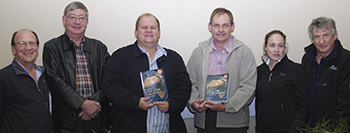
From the left are: Prof Johann du Preez (UFS), Prof Barry Frey (retired Dean of the Faculty of Environmental and Health Sciences, CUT), Prof Nico Smit (NWU), Prof Leslie Brown (Unisa), Ms Alechea Engelbrecht (UFS), and Prof Jo van As (UFS).
Photo: Supplied |
The SA Academy for Science and Arts has honoured Professors Jo van As and Johann du Preez from the University of the Free State, together with academics from two other universities, Prof Nico Smit (North-West University) and Prof Leslie Brown (Unisa).
The medal of honour from the SA Academy’s Faculty of Science and Technology has been awarded to the four researchers for their book, Die verhaal van lewe en die omgewing: 'n Afrika-perspektief.
In 2012, this book was published in English as The Story of Life and the Environment: an African Perspective. From the outset, the project was meant to be published also in Afrikaans, specifically to make ecology as discipline available to students and nature lovers in Afrikaans.
The book is in full colour and has over 750 colour photos and nearly 200 illustrations specially designed to explain processes and systems.
The medal is awarded for achievements in, and contributions to, the furthering and development of a particular area in the natural sciences.
The authors, who are established researchers in the natural and life sciences, make a valuable contribution in an accessible yet scientific manner. The book conveys previously difficult-to-understand concepts in an interesting way to the ordinary reader.
The award ceremony will take place on 24 June 2015 in Stellenbosch.